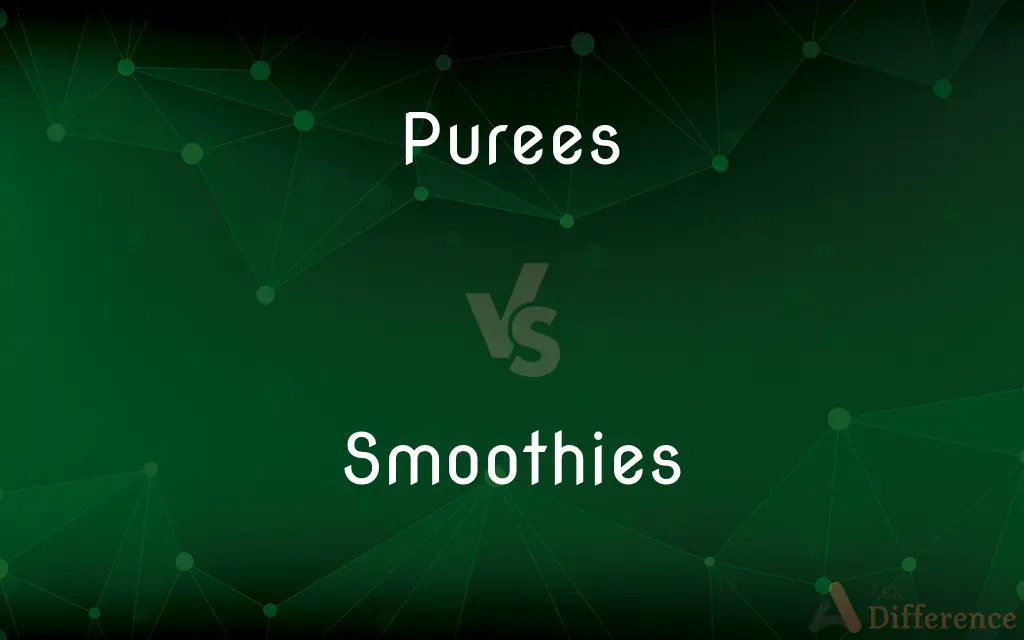Purees vs. Smoothies — What's the Difference?
By Tayyaba Rehman — Published on December 13, 2023
Purees are smoothly blended ingredients without chunks, often cooked, while Smoothies are blended beverages with a mix of fruits, vegetables, and liquids, typically consumed cold.

Difference Between Purees and Smoothies
Table of Contents
ADVERTISEMENT
Key Differences
Purees are often a result of processing fruits, vegetables, or meats into a smooth consistency. They are typically cooked, resulting in a texture without lumps or chunks. Smoothies, on the other hand, are beverages made by blending various ingredients, including fruits, vegetables, yogurts, and liquids like milk or juice, often served chilled or with ice.
Purees are versatile and can be used as bases for soups, baby foods, sauces, or desserts. They focus on achieving a uniform texture, and the flavors come from the ingredients themselves. Smoothies, conversely, are a medley of flavors. Ingredients for smoothies are chosen to complement each other, and additional items like sweeteners, proteins, or supplements can be added to enhance the taste or nutritional value.
The process of making Purees might involve cooking the ingredients first, followed by blending to achieve the desired texture. It's about refining the texture of a single ingredient or a combination of ingredients. In contrast, Smoothies are about combining raw or frozen ingredients to create a refreshing drink, often enjoyed as a snack, breakfast, or post-workout meal.
Lastly, while Purees serve multiple culinary purposes, Smoothies have gained popularity as health drinks. They can be tailored to dietary needs, incorporating elements like protein powders, seeds, nuts, or superfoods. Purees, though nutritious, don't always aim for the health-focused combinations that smoothies often do.
Comparison Chart
Nature
Smooth, often cooked mixture.
Cold, blended beverage.
ADVERTISEMENT
Main Ingredients
Fruits, vegetables, meats.
Fruits, vegetables, yogurts, liquids.
Purpose
Base for soups, sauces, baby food.
Beverage, snack, or meal replacement.
Texture Focus
Uniform, lump-free consistency.
Blend of ingredients, can be thick or thin.
Typical Additives
Seasonings, spices.
Sweeteners, protein powders, seeds, nuts.
Compare with Definitions
Purees
A smooth, creamy substance made of liquidized or crushed fruit or vegetables.
Apple purees are commonly used in baking.
Smoothies
A cold drink made by blending fruits with liquids.
Tropical fruit smoothies are perfect for summer.
Purees
A thick paste or mixture free from lumps.
For baby food, most vegetables are turned into purees.
Smoothies
A thick beverage made from blended raw fruit or vegetables with other ingredients such as water, ice, or yogurt.
I start my day with green smoothies for a health boost.
Purees
Processed food that has been ground or blended to a smooth consistency.
The chef added tomato purees to the soup for richness.
Smoothies
A creamy beverage made by pureeing various ingredients in a blender.
Protein smoothies are popular among athletes.
Purees
Ingredients processed to achieve a velvety texture.
The berry purees were used as a dessert topping.
Smoothies
Drinks made by mixing ingredients until they are smooth and uniform.
Breakfast smoothies might include oats and bananas for added energy.
Purees
Cooked food that's been mechanically processed to a soft, lump-free form.
The potatoes were mashed into purees for the dish.
Smoothies
A blended mixture typically consisting of fruit, liquid, and other additives.
Vegan smoothies often use almond milk as a base.
Purees
To rub through a strainer or process (food) in a blender.
Smoothies
(Informal) A person regarded as being assured and artfully ingratiating in manner.
Purees
Food prepared by straining or blending.
Smoothies
A drink that is made of fruit or sometimes vegetables and is blended with juice, milk, or yogurt and often ice until smooth.
Purees
Plural of puree
Smoothies
Plural of smoothie
Purees
Infl of puree
Common Curiosities
How are Smoothies typically consumed?
Smoothies are usually consumed cold, as beverages or meal replacements.
Can Purees contain meat?
Yes, meats can be processed into purees, especially for dishes or baby foods.
Do Purees always need cooking?
Not always, but many purees involve cooking ingredients before blending.
What makes Smoothies popular for health enthusiasts?
Smoothies can be tailored with nutritious ingredients, making them health-focused drinks.
How long can Purees be stored?
It depends on the ingredients, but most purees should be consumed within a few days when refrigerated.
What equipment is essential for making Purees?
A blender or food processor is typically used to make purees.
Are Smoothies suitable for weight loss?
When made with healthy ingredients and in controlled portions, smoothies can be part of a weight loss plan.
What are Purees primarily used for?
Purees are often used as bases for soups, sauces, baby food, or desserts.
Are Purees always savory?
No, purees can be sweet or savory, depending on the ingredients.
Can Smoothies be made without fruits?
Yes, smoothies can be vegetable-based or a mix of both fruits and vegetables.
Can dairy products be added to Smoothies?
Yes, yogurts, milk, or cream are common additions to smoothies.
Do Smoothies always contain ice?
No, but ice is often added to make smoothies cold and refreshing.
Can Purees be frozen for later use?
Yes, many purees can be frozen and thawed for later use.
Can protein powder be added to Smoothies?
Yes, protein powder is a common additive in smoothies, especially for fitness enthusiasts.
What's the key difference in texture between Purees and Smoothies?
Purees aim for a uniformly smooth texture, while smoothies can vary in thickness and consistency.
Share Your Discovery

Previous Comparison
HD vs. HD Ready
Next Comparison
Degrees vs. RadiansAuthor Spotlight
Written by
Tayyaba RehmanTayyaba Rehman is a distinguished writer, currently serving as a primary contributor to askdifference.com. As a researcher in semantics and etymology, Tayyaba's passion for the complexity of languages and their distinctions has found a perfect home on the platform. Tayyaba delves into the intricacies of language, distinguishing between commonly confused words and phrases, thereby providing clarity for readers worldwide.
















































